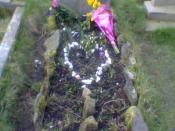"Daddy"
In the poem "Daddy," Sylvia Plath attempts to flee from the memory of her brutal father, who died when she was ten years of age. She employs short stanzas that contain powerful imagery to convey to the reader the oppression she received from her father. At the conclusion of the poem, Plath realizes that her husband is actually a reincarnate of her dead father. Through the use of powerful imagery and dominant allusions, Plath successfully conveys the image of her brutal father to the reader.
Plath utilizes strong imagery to create a brutal image of her father. She introduces the imagery in the first stanza of the poem when mentioning the "black shoe in which I have lived in like a foot for thirty years." She compares herself to the foot and her father to the shoe. Typically this image would be a positive one; a shoe protects a foot and keeps it warm.
However, in this case, the shoe is meant to entrap the foot and choke it. She also identifies the shoe as black, which alludes to death. This could cause the reader to think of the shoe as a corpse that fits tightly in a coffin. Plath also reveals qualities about her father when referring to him as "marble-heavy." Marble should evoke a positive image because it is valuable and costly, but, in this instance, it is also rigid and cold, like her father. The poem also includes consistent war imagery. Line 47 says "so black no sky could squeak through." In wartimes, no blue sky can be seen because of the gun-powder and smoke of the airplanes. Metaphorically speaking, Plath's father darkens, or haunts, her sky, or her life. Plath creates a childlike image throughout the poem by constantly utilizing the expression "Daddy." She often...


